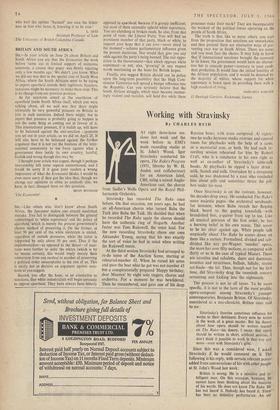Si,—Like others who 'don't know' about South Africa, the Spectator
makes one crucial analytical mistake. You fail to distinguish between the general commitment to 'white supremacy' and the policy of apartheid, which is merely the present government's chosen method of preserving it. On the former, at least 90 per cent of the white electorate is united, regardless of outside pressures; while the latter is supported by only about 50 per cent. Thus if the implementation—as opposed to the threat—of sanc- tions were further to unite the whites (which is by no means certain), this would imply merely their conversion from one method to another of preserving a political order unacceptable to the rest of us. This is surely not as decisive an argument against sanc- tions as you suggest.
Second, you offer the hope, as an alternative to sanctions, that white industrialists will begin seriously to oppose apartheid. They have always been bitterly opposed to apartheid, because it is grossly inefficient; but most of them staunchly uphold white supremacy. You are clutching at broken reeds. So also, from that point of view, the Liberal Party. You will find no prominent member of that party, black or white, to support your hope that it can ever—never mind 'at the moment'—achieve parliamentary influence given the present electorate. Nor would they give you any odds against the party's being banned. The real oppo- sition to the Government—that which opposes white supremacy—is not, alas, 'growing' in any respect worth mentioning as the basis for British hopes.
Finally, you suggest Britain should rest its policy upon the long-term possibility that the High Com- mission Territories will spread a benign influence into the Republic. Can you seriously believe that the South African struggle, which must become increas- ingly violent and racialist, will hold fire while these processes make their mark? They are incomparably the weakest of the political forces operating on the people of South Africa.
The truth is that, like so many others, you start from the proposition that sanctions are unworkable, and then pretend there are alternative ways of pre- venting race war in South Africa. There are none; and you must face the choice. It may help to know that if international sanctions brought the economy to its knees; the government would have no alterna- tive but to concede power—contrary to your confi- dent prediction. It would face the united hostility of the African population; and it would be deserted by the majority of whites, whose support for white supremacy is based upon its providing them with a high standard of living.
MARGARET ROBERTS
15 Denbigh Gardens, Richmond, Surrey






























 Previous page
Previous page